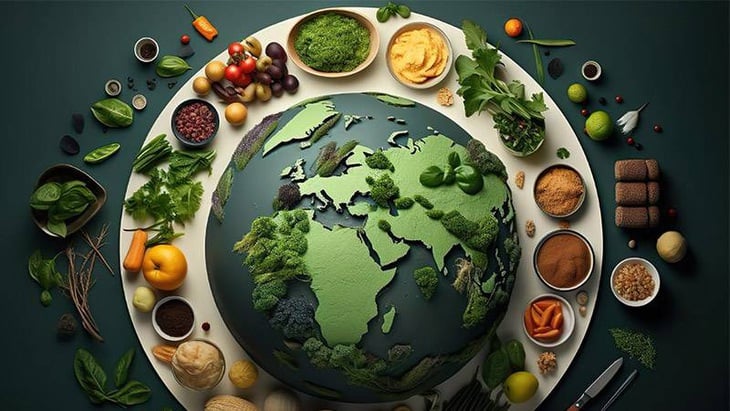
A balanced diet will help the body become healthier - Illustration
A balanced diet rich in these nutrients helps you stay healthier, supporting your muscles, bones, immune system, digestive system, eyes, and many other functions.
Carbohydrate
Carbohydrates are one of the three macronutrients. They are an important source of energy and calories for the body. There are three types of carbohydrates:
Sugar: also known as simple carbohydrates. Sugar is found in foods such as fruits, milk, desserts, candy, and sugary drinks.
Starch: also known as a complex carbohydrate because it is made up of many simple sugar molecules linked together. You can find starch in foods such as bread, cereals, and starchy vegetables.
Fiber: Another type of complex carbohydrate is fiber. Fiber helps you feel fuller for longer, stabilizes blood sugar, and supports healthy digestion.
Carbohydrates should make up 45-65% of your total daily energy intake. For a 2,000-calorie-per-day diet, you need approximately 225-325g of carbohydrates per day. In a balanced diet, the majority of carbohydrates should come from fruits, vegetables, and low-fat dairy.
Protein
Protein is also a macronutrient, serving as the body's source of calories. It is the building block of muscles, bones, skin, cartilage, and blood. The body needs protein to produce hormones, enzymes, and vitamins.
Proteins are made up of amino acids. Among them are 9 essential amino acids that the body cannot synthesize on its own, so you need to obtain them through your diet.
Eating a variety of protein-rich foods will help you get all nine essential amino acids, along with many vitamins and minerals such as B vitamins, zinc, and magnesium.
Some protein-rich foods include: meat, fish, dairy products, nuts, legumes, and whole grains.
Your protein requirements depend on your age, gender, height, weight, and activity level. Generally, protein should make up 10-35% of your total daily calorie intake. If you are very physically active, especially with strength training (resistance training), you will need more protein.
Fat
Fat is also a macronutrient and an important source of energy for the body. Fat also plays a vital role in hair, skin, and brain health. Fat-soluble vitamins (vitamins A, D, E, and K) require sufficient fat intake for absorption.
The two main types of fat include:
Saturated fat: This type of fat is found in animal-derived foods such as meat and dairy products. Eating too much saturated fat can increase LDL cholesterol levels (the bad kind), thereby increasing the risk of cardiovascular disease.
Unsaturated fats: This type of fat is mainly found in plant-based foods such as non-tropical vegetable oils, nuts, and avocados. It is also found in fish such as salmon or mackerel. Replacing saturated fats with unsaturated fats can help improve blood cholesterol levels.
Vitamin
Vitamins are considered micronutrients – nutrients that only need to be consumed in small amounts but play a crucial role in many aspects of health.
Vitamins play a role in red blood cell production, brain function, skin health, energy metabolism, cardiovascular health, and many other functions.
There are 13 essential vitamins, including vitamins A, C, D, E, K, and eight B vitamins. Vitamins are classified into two main groups:
Fat-soluble vitamins include vitamins A, D, E, and K.
Water-soluble vitamins: including vitamin C and the B vitamins.
Vitamins are found in many different foods, so it's important to maintain a balanced diet rich in fruits, vegetables, legumes, whole grains, and fortified dairy products.
Each food group contains different essential vitamins. You can also supplement your vitamin intake with pills if you cannot meet your needs through food alone.
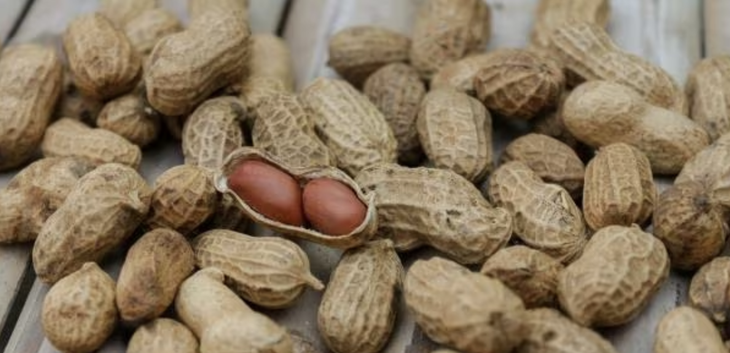
Peanuts and other nuts contain many minerals that are good for the body - Photo: indianexpress
Minerals
Like vitamins, minerals are micronutrients, meaning the body only needs very small amounts, but they are crucial for health. Minerals help maintain the health of bones, muscles, the cardiovascular system, and the brain. Some examples of minerals include calcium, phosphorus, sodium, potassium, and iron.
Each mineral performs a specific function in the body. For example, calcium plays a key role in strengthening bones, while potassium helps lower blood pressure.
You can supplement your mineral intake from many foods such as nuts, beans, eggs, legumes, and vegetables. Additionally, you can use mineral supplements if needed.
The amount of minerals needed varies depending on the type of mineral, age, gender, and health condition. For example, if you are menstruating or pregnant, you may need more iron.
Water
Water is an essential nutrient, making up about 70% of body weight. Staying adequately hydrated helps prevent constipation, kidney stones, and urinary tract infections. Water also helps regulate body temperature. Not drinking enough water can lead to symptoms such as dizziness, headaches, or digestive problems.
In cases of severe dehydration, you may experience confusion, kidney failure, or cardiovascular problems.
Your water needs can vary depending on your age, gender, pregnancy or breastfeeding status, level of physical activity, and local climate.
Most adults need about 11.5–15.5 cups of water per day, including water from beverages and water-rich foods like fruits and vegetables. Of that, you need 9–13 cups of water from beverages each day.
For optimal health, you should prioritize sugar-free drinks such as water, unsweetened soda, low-fat milk, or unsweetened tea.
Sugary drinks like soda or sweetened fruit juices still provide hydration, but they also contain a lot of added sugar, which can lead to type 2 diabetes and cardiovascular disease.
To ensure good health, try to supplement your diet with essential nutrients every day.
You can supplement essential nutrients through foods such as whole grains, fruits, vegetables, fish, nuts, lean meats, and low-fat dairy products.
Additionally, prioritize sugar-free drinks such as water, low-fat milk, unsweetened tea, or unsweetened coffee.
Source: https://tuoitre.vn/nhung-chat-dinh-duong-nao-can-thiet-cho-co-the-20250719132615751.htm


![[Photo] Prime Minister Pham Minh Chinh holds a phone call with the CEO of Russia's Rosatom Corporation.](/_next/image?url=https%3A%2F%2Fvphoto.vietnam.vn%2Fthumb%2F1200x675%2Fvietnam%2Fresource%2FIMAGE%2F2025%2F12%2F11%2F1765464552365_dsc-5295-jpg.webp&w=3840&q=75)


![[Photo] Closing Ceremony of the 10th Session of the 15th National Assembly](/_next/image?url=https%3A%2F%2Fvphoto.vietnam.vn%2Fthumb%2F1200x675%2Fvietnam%2Fresource%2FIMAGE%2F2025%2F12%2F11%2F1765448959967_image-1437-jpg.webp&w=3840&q=75)


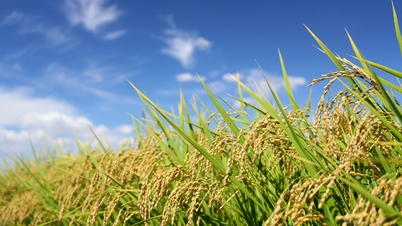




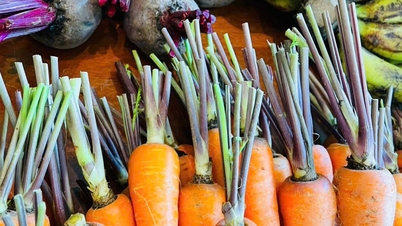
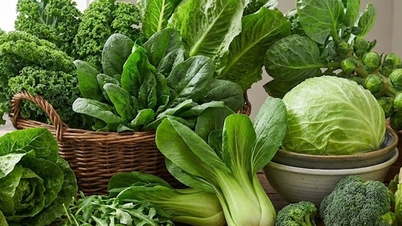

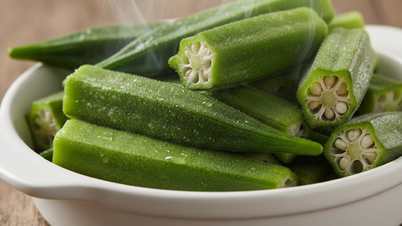








































![[OFFICIAL] MISA GROUP ANNOUNCES ITS PIONEERING BRAND POSITIONING IN BUILDING AGENTIC AI FOR BUSINESSES, HOUSEHOLDS, AND THE GOVERNMENT](https://vphoto.vietnam.vn/thumb/402x226/vietnam/resource/IMAGE/2025/12/11/1765444754256_agentic-ai_postfb-scaled.png)



















































Comment (0)